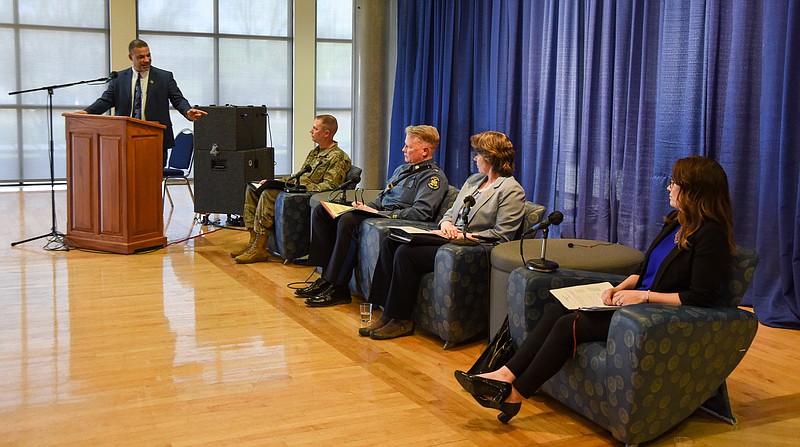Missouri faces some concerning public safety challenges and state leaders want your help.
At a security expert panel discussion hosted by Lincoln University on Thursday, division leaders from the Missouri Department of Public Safety said more help from the public is among the greatest needs for law enforcement and emergency management systems in the state.
"There are some really challenging, kind of weighty issues that we talked about today that pose some challenging and difficult problems, and we need great folks that are willing to jump in and assist us with getting after that," said Charles Hausman, Missouri National Guard director of the joint staff. "You can do that in many different ways and at many different levels, but the key is we need you to be involved."
Involvement can be as simple as volunteering at a food bank, Hausman said, which some National Guard soldiers covered when there weren't enough volunteers amid the COVID-19 pandemic.
In addition to Hausman, Thursday's panel consisted of Kylie Dickneite, director of the Missouri Office of Homeland Security; Eric Olson, superintendent of the Missouri Highway Patrol; and Sandy Karsten, director of the Missouri Department of Public Safety.
Together, they fielded questions on a variety of topics, from how the state plans to respond to natural disasters, extremism and threats to infrastructure, to lessons from the COVID-19 pandemic and how they balance Missouri's fervent gun culture with the Second Amendment.
Each of the state leaders touched on the importance of engaging the public to best serve Missouri's communities.
"Anything that communities can do to help bring attention to law enforcement authorities if things are not the way they should be in their communities, let us know what you're seeing as the threats out there because if we don't know we can't do anything about it," Dickneite said.
The COVID-19 pandemic helped shape all of the agencies' understanding of the value the public can have in responding to emergencies, the leaders said.
Karsten said individual citizens, nonprofit groups and private businesses stepped up to provide resources and care for communities throughout the pandemic, and that was necessary because the state couldn't do it all.
"During COVID, we saw that it takes everyone to put a plan in place and everyone to respond and reach that common goal," she said. "Very, very important for all the public-private partnerships."
Public safety messaging was also important during the pandemic, Hausman pointed out. He said there was a focus on the state level to have consensus on the message before distributing it to the public, which helped keep people on the same page and avoid polarizing mixed messages.
Communication between law enforcement and the general public is particularly crucial for countering extremism and terrorism, Olson said.
Similar to how law enforcement agencies share information with one another, Olson said communication with the public needs to be quick and often. Highway Patrol troopers work in all counties of the state every day, he explained, so having relationships with local business owners, religious leaders and community leaders is a priority.
"Just being involved in the communication there and having the dialogue about extreme behavior is one very good avenue to getting in on information and preventing a problem in the future," he said.
Olson said it's incumbent on law enforcement officers to maintain a bridge of trust with the communities they serve so citizens continue to interact with them in a positive light.
He said the Highway Patrol is working on outreach throughout the state, particularly in areas where there is less interaction.
"Law enforcement will only be as successful as the citizens in the community want it to be," Olson said. "The police are the people and the people are the police."
The panel also addressed what they see as the greatest natural disaster threats to Missouri.
Hausman said any activity at the New Madrid fault line has the potential to create a regional disaster that would likely require national attention. He said the National Guard is preparing with numerous exercises with federal and state partners to be better organized.
Olson said flash flooding or a heavy blizzard are also natural events to watch. Flash floods are extremely localized, he said, so the Highway Patrol is working to train more local agencies in how to respond to them. An extreme snowstorm can leave drivers stranded on impassible roadways, he said, but the patrol is committed to serving Missourians during those events.
On the topic of credible threats to infrastructure, Olson said the rising rate of traffic fatalities is a major public safety issue in Missouri. The state reached a 15-year high last year.
Karsten and Hausman took the infrastructure topic to cybersecurity, stressing that a cyber attack on power grids or state information systems would have far-reaching compounding effects. They said they're involved in ongoing discussions about how the state can strengthen its digital security.
And different parts of the state have different infrastructure needs, Dickneite said. The Missouri Office of Homeland Security offers several grant programs that support local initiatives to address what communities identify as their biggest needs.

